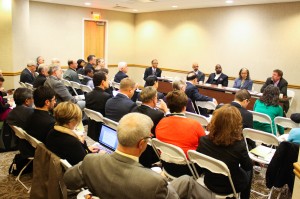By: Kari Wozniak & Lizzy Engele, ADM Institute

Panelists discuss partnerships & collaboration to full room at Borlaug Dialogue side event. Credit: ADMI/K.Wozniak
How will we overcome the greatest challenge in human history?
This was the question posed to us at this year’s World Food Prize Borlaug Dialogue. In Des Moines, Iowa, symposium-goers rallied behind three I’s to answer this question – through intensification, innovation, and inspiration.
The event we hosted fell in line with these themes. The panelists moved beyond raising awareness and focused on how to identify and drive solutions forward for postharvest loss prevention. The panel’s answer for how to intensify support, create innovations, and inspire action for PHL was through partnerships and collaboration.
Speakers for the panel titled, “Partnerships and Collaboration for Global Postharvest Loss Prevention” were the following:
- Mr. CD Glin, Associate Director at the Africa Regional Office, The Rockefeller Foundation
- Dr. Robert Hauser, Dean, College of Agricultural, Consumer, & Environmental Sciences at UIUC
- Dr. Ahmed Kablan, International Nutrition & Public Health Research Adviser, Bureau of Food Security, USAID
- Ms. Charlene McKoin, Senior Program Office, the Bill and Melinda Gates Foundation
The panel highlighted key areas for collaboration.
For organizations that invest in research and development, postharvest loss measurements are still sorely needed. Getting these measurements is not an easy nor inexpensive endeavor, which is likely why we don’t have them already (see an earlier blog post on the cost of measurement). But new innovations are emerging, such as the ADM Institute Postharvest Investment Tool. Tools and methods that demonstrate return on investment (ROI) are crucial, the panel agreed.
Panelists also discussed the need for knowledge-sharing platforms for both practitioners and farmers. McKoin, a strong advocate for better transfer of knowledge between those who have and those who need solutions, spoke of the need for global Communities of Practice for postharvest loss reduction. “Many times we have seen that farmers don’t even know all of the technologies that exist”.
The panel agreed that ICT’s can be an important innovation in achieving that knowledge transfer. The innovations cannot develop unsupported, however. Currently 95% of R&D dollars for agricultural development go towards production phases. Kablan talked on the need to raise awareness for more post-production funding, and highlighted USAID’s Feed the Future Innovation Labs as an example. The program has several labs focused on post-production, including the Lab for PHL Reduction co-led by Kansas State University and the ADM Institute.
From the lens of differing organizations, all panelists agreed on the need for impact.
Dean Hauser spoke of the increase in demand for interdisciplinary research from universities, as well as growing pressure to leverage public-private partnerships. More and more, research needs to demonstrate direct impact, he said.
For postharvest loss, the impact we want to see is clear. As Glin put it, “Reducing postharvest loss is about improving lives, increasing incomes, and preserving the environment.”
Through this event and others, the ADM Institute is continuing to intensify awareness for the postharvest loss issue, finding innovative ways to combat the problem, and inspiring others to join the effort to make these improvements a reality.
Collaborate and contribute @PHL_Institute. You can join the conversation using #postharvest.


No comments yet.